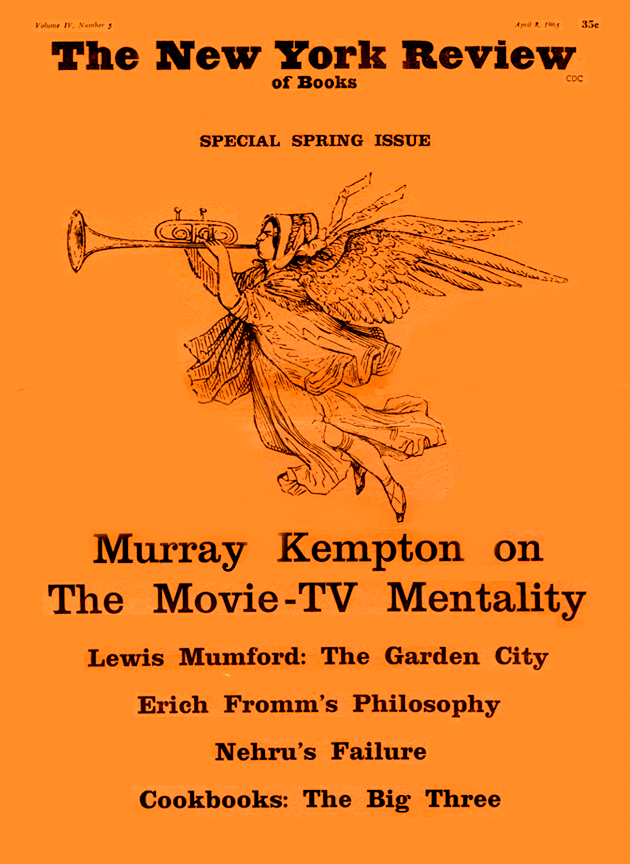In response to:
The Play that Dare Not Speak Its Name from the February 25, 1965 issue
To the Editors:
Philip Roth apparently missed the predominant animal symbolism of [Tiny Alice] (which makes reference to The Zoo Story more appropriate than comparison with Who’s Afraid of Virginia Woolf?). Tiny Alice opens with the lawyer trying to provoke two cardinals in a cage into singing (the scarlet male is the songbird!), moves to the lawyer and the Cardinal furiously exchanging animal epithets, rises to Julian’s eloquent dream of his martyrdom in the embrace of a lion, and falls to the presence of a mouse (tiny Alice?) in the miniature castle—all of which undermines the metaphysical theme of the play: man must embrace his animal nature, however lowly it may seem to him.
Roth closes his review with the protest, “How long before a play [will present] the homosexual hero as a homosexual, and not disguised as an angst-ridden priest, or an angry Negro, or an aging actress; or, worst of all, Everyman?” That last reference surely reveals Roth’s bias against metaphysical themes; but how dare he have the presumption to deny the playwright his own terms? And what is so glorious about just plain homosexuality, the defense of which seems to be the modern Romantic’s preoccupation? Albee is perfectly justified, on psychological and metaphysical grounds, in suggesting that Julian’s (latent) homosexuality is merely a way of denying his fleshly and animal nature.
John V. Hagopian
Department of English
Harpur College
Binghamton, New York
To the Editors:
…The idea that the homosexual cannot partake of the mysteries of the heterosexual Soul cannot be regarded as anything less pathetic than a form of sex fascism, similar to the cultural fascism which imagines that the Jew cannot understand the gentile (Aryan) soul. Like the Jew, the homosexual pricks, bleeds, feels pain with an equal, if not greater intensity than his Normal Aryan counterpart. He is as able to understand the plight of the heterosexual as a man (such as Tolstoy) can understand the plight of a woman (such as Anna Karenina). And he will continue to write about the entire world of Negroes, actresses, men, women children and dogs. He will not be hounded into any cultural ghetto by the literary fascism of the likes of Philip Roth.
Leo Skir
New York City
To the Editors:
Philip Roth is correct about the underlying intentions of Tiny Alice, but why does he write as though it were a dirty little secret which Albee cannot face? The very title of the play itself is, within homosexual circles, a phrase for a masculine derrière. Obviously Albee is not seeking concealment, is seeking rather more striking imagery and situations for the truths he wishes to impart than the bare “homosexual hero” Roth asks for can ever suggest.
And is Roth, by pointing to the homosexuality of the play, pointing to its meaning? Or has Roth really stopped short, with this disclosure, blandly satisfied with a simple understanding of a commonplace Freudian structure that ought to be seen as the starting point of the play, not its conclusion.
Morris Belsnick
New Haven, Connecticut
Philip Roth replies:
1. What Professor Hagopian thinks of as “symbolism,” I consider decoration; what seems to him “a metaphysical theme” seems to me a banal cliché. Why must man embrace his animal nature? To be happy? To be good? To survive? And why assume sexuality is “animal” as opposed to human? And how difficult an “embrace” is it? how costly? how likely? And what makes Julian a representative of “man”? I don’t see where Albee attends to any of these questions by putting a birdcage on the stage, or sticking a mouse in a castle. Maybe Professor Hagopian shouldn’t be so quick to assume he is the one with the “metaphysical” bias, that is not how I would describe the interests of someone so enthralled by what is remote and artificial, and so off-hand and removed about “just plain homosexuality.”
And he misreads my last sentence if he thinks I am calling for plays of social protest, or for a defense of homosexuality on the stage. Rather, I was suggesting an approach that has so far seemed beyond the homosexual playwright in America—that is, less defensiveness. There, after all, is one of the ways a person begins to embrace what is unusual in his nature, or to defy it. Probably the professor would have gotten my meaning immediately, if only I had been more obscure.
2. Mr. Skir has worked himself into a lather of high-mindedness by ascribing to me a point of view I do not hold, and which was neither stated nor implied in my review.
3. If Mr. Belsnick is right about the homosexual argot, and if the pun was intentional, then the play is even worse than I thought it was.
This Issue
April 8, 1965


